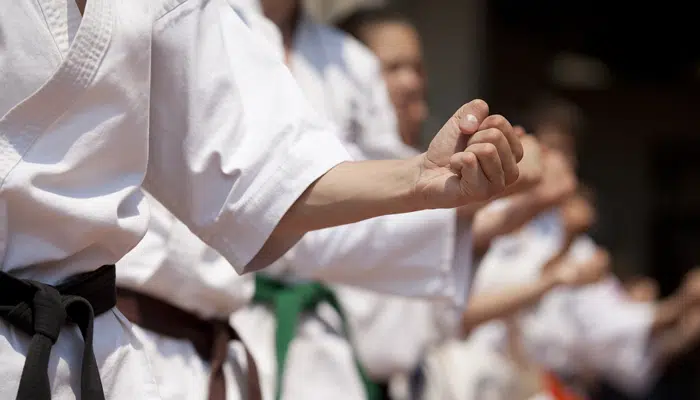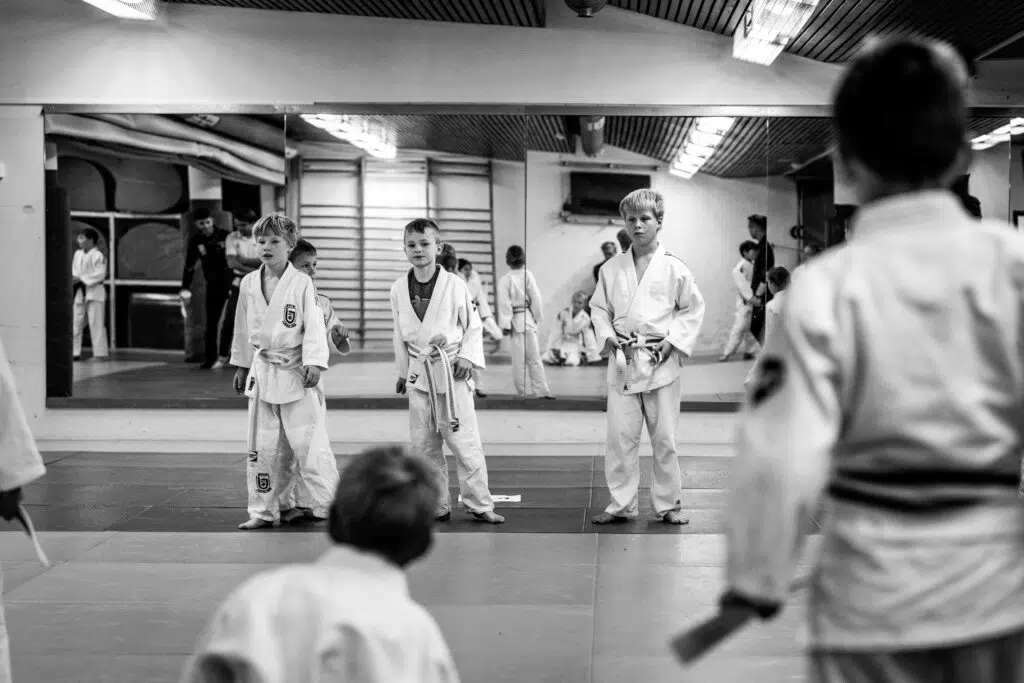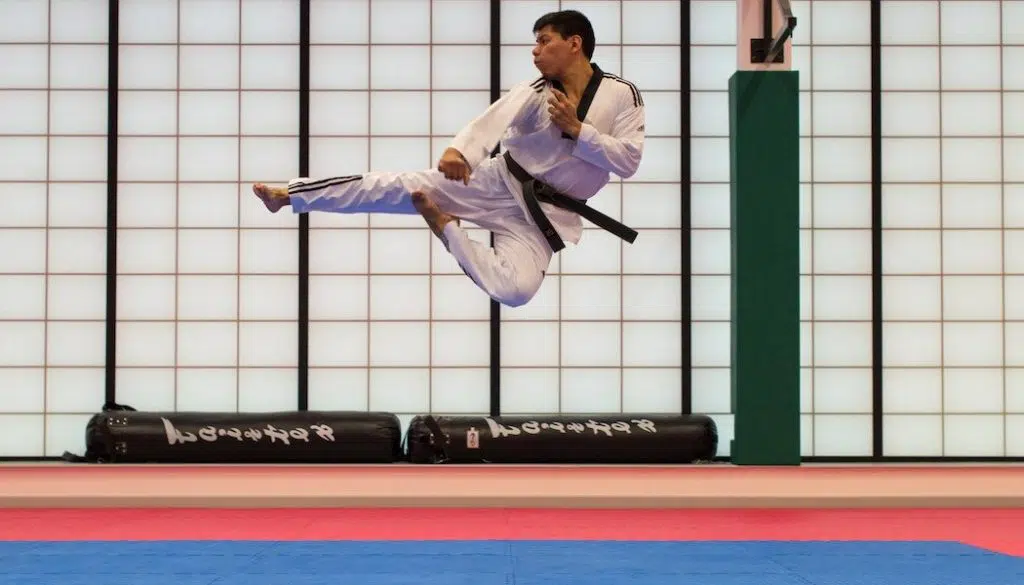Martial arts classes offer more than a simple opportunity for fitness and exercise. They boost confidence, instill important values, and provide the basic framework for self-defense. If you want to take your passion to the next level by starting your own martial arts school, this post is for you!
Starting Your Martial Arts School: A Checklist
If you’re familiar with the study of martial arts, you probably recognize the importance of focus. A checklist is an easy way to zone in on the big picture as you start your business. Consider this a roadmap to help you stay disciplined. Scroll down for more information on each of these points.
- Learn from others by shadowing
- Research and prepare for many roles
- Develop a solid martial arts school business plan
- Find your perfect facility or location
- Set up your space with the right equipment
- Hire a team that will support your vision
- Set up business systems and processes
- Spread the word with the right marketing plan
- Get involved in the community to make connections
- Start from a place of organization
Eager to learn more about starting your own martial arts school? Let’s dive in!
1. Learn from others
Is there someone you know starting a martial arts club? Have you been to a great martial arts school in another city or town?
They say imitation is the sincerest form of flattery. Find someone to mentor you as you embark on this journey. It will give you an inside look at how things work on an everyday basis.
Take note of any challenges that come up and how the person works to solve them.
2. Examine your many roles
By shadowing another martial arts school owner or manager, you’ll probably notice they wear many hats. Running your own business requires you to be an entrepreneur, mentor, accountant, and more!
While teaching is an important part of the job, you’ll have to do much more to keep your business running. Think about the roles you feel confident in taking on vs. which ones would be better to outsource.

3. Develop your martial arts school business plan
One of the most important requirements to start a martial arts school is a solid business plan. In fact, this is a crucial step for any aspiring business owner. We have more information about creating a studio business plan here, but your martial arts school business plan should cover the following sections:
- Executive Summary: Clarify your main business goals and core values in a few sentences. This section should also clearly establish what type of legal business entity your school will be, and how you’ll comply with any local licensing or regulatory martial arts school requirements.
- Market Analysis: Research your potential customers, as well as the surrounding competition. What is the martial arts industry like in your area? This will help you determine your pricing.
- Products and Services: Discuss important details about the types of classes you plan to offer. Include any other ways you plan to make money, such as merchandise or events.
- Financial Projections: This section should detail where your revenue will come from and how much your bills will cost. Think of everything you will need to open your doors, including equipment and office essentials. Be thorough! This will help you in the long run.
- Marketing Overview: Determine important elements of your branding. This may be your school name, logo, and perhaps a slogan. Provide information about how you plan to market your martial arts school and what you’d like to spend on advertising.

4. Find your perfect location
Now that you have a business plan in place, you should be able to determine a comfortable budget. Whether you buy or rent your space, be sure to stick to an amount you will be able to manage.
Beyond price, consider the size. Do you want more than one room to enable two classes to take place at the same time? You should also consider the need for:
- A lobby
- An office
- Storage
- Bathrooms
- Parking
While it may cost more, remember that visibility can boost your passive marketing. If parents and students can spot your business in a safe and popular location, you can boost enrollment organically.
5. Set up your space
The right equipment will help you as you’re starting and running your own martial arts school.
Mats are one of the most crucial elements because they keep your students safe and free from injuries. Browse our guide to finding the best martial arts mats for your studio.
You may also want to consider floor-to-ceiling mirrors to allow your students a better view for perfecting their movements.

6. Hire the right people
As an owner, there may be too many tasks on your plate in the beginning. With this in mind, your first hire will likely be someone else to teach your classes. You may also want someone to help manage the front desk.
Start by making a clear outline of each position and what they do on a daily, weekly, and monthly basis. From there, develop a contract that formally defines pay, benefits, and expectations. Don’t be afraid to use a trial period for new teachers and staff.
7. Set up your systems and processes
The basic systems and processes you put into place will help your business run smoothly every day. Develop an annual calendar with instruction periods, breaks, and special events. Before your grand opening, develop a plan for enrollment. For example, how will you keep track of students, tuition, and payroll?

8. Spread the word with marketing
Start by establishing your brand. What’s your studio’s name, logo, and brand identity? The hope is that your school will grow from referrals, but marketing is a helpful tool, especially in the beginning. Think about the channels you want to use, including billboards, newspaper ads, or even commercials. Devise a plan for what portion of your budget you’ll allocate to these things.
9. Get involved in your community
It’s a small world when it comes to local businesses. Owners lean on each other for advice, referrals, and much more. Also, advertising for your classes at nearby businesses that are not competitors, but will have the clientele that would take an interest in martial arts (think dance studios or daycares) can help you get started.
10. Develop a plan to stay organized
Organization is one of the main requirements to start a martial arts school. You want students and parents to trust you, and frequent mistakes in billing or enrollment can put your success in jeopardy.
One of the best ways to prepare is by investing in studio management software like the one we offer at Studio Director. Not only does high-quality software keep your business in order, it helps you automate some of your marketing efforts and provides additional value to your customers with easy online registration, payments, and more.

Why Ongoing Learning is Important When Running a Martial Arts Studio
Running a successful martial arts school requires more than just being an expert in the martial art you teach. As martial arts school owners, it’s crucial to continuously learn and adapt to keep your business thriving. Unfortunately, many martial arts schools fail because they neglect this aspect. With ongoing learning, you can avoid common pitfalls and ensure your martial arts studio stands out.
- Understanding the Business Side – Just as you would teach martial arts to new students, you must learn about running a business. This includes understanding martial arts insurance, marketing strategies, and managing finances, which can be made easier with martial arts billing software.
- Keeping Up with Trends – The martial arts industry is ever-evolving. By staying informed about the latest trends, such as popular training equipment or sought-after martial arts styles, , you can attract more students to your martial arts dojo. You should also stay up to date any new software for martial arts studio management.
- Improving Teaching Methods – Effective teaching methods can significantly enhance your students’ martial arts training experience. Ongoing learning allows you to discover and implement innovative ways of teaching martial arts.
- Location Planning – The location of your martial art schools can greatly impact your success. By continuously learning about demographic trends and location strategies, you can choose the ideal martial arts location for your studio.
The journey of a martial arts school owner doesn’t end with opening a studio. It’s a continuous process of learning and growing to ensure the success of your martial arts business.
Start your martial arts school
People don’t start a martial arts school to focus on administrative tasks. Give yourself the opportunity to truly enjoy your craft by partnering with Studio Director.
We streamline billing and communications, allow students to enroll online, and offer payment processing tools. We free your time so you can teach, reach out to your community, and get to know your students. Our unique software serves as your support staff (without the extra headcount).


